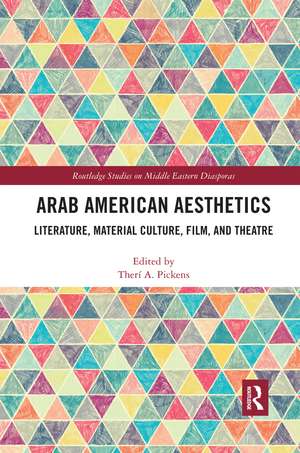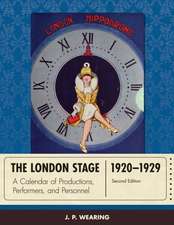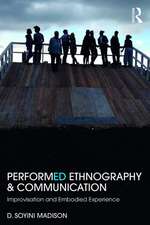Arab American Aesthetics: Literature, Material Culture, Film, and Theatre: Routledge Studies on Middle Eastern Diasporas
Editat de Therí Pickensen Limba Engleză Paperback – 14 aug 2020
This book seeks to unsettle current conversations within Arab American Studies that neglect aesthetics as a set of choices and constraints. Rather than divorce aesthetics from politics, the book sutures the two more closely together by challenging the causal relationship so often attributed to them. The conversations include formal choices, but also extend to the broad idea of what makes a work distinctly Arab American. That is, what about its beauty, ugliness, sublimity, or humor is explicitly tied to it as part of a tradition of Arab American arts? The book opens up the ways that we discuss Arab American literary and fine arts, so that we understand how Arab American identity and experience begets Arab American artistic enterprise. Split into three sections, the first offers a set of theoretical propositions for understanding aesthetics that traverse Arab American cultural production. The second section focuses on material culture as a way to think through the creation of objects as an aesthetic enterprise. The final section looks at narratives in theatre and how the impact of such a medium has the potential to recreate in both senses of the word: play and invention.
By shifting the conversation from identity politics to the relationship between politics and aesthetics, this book provides an important contribution to Arab American studies. It will also appeal to students and scholars of ethnic studies, museum studies, and cultural studies.
| Toate formatele și edițiile | Preț | Express |
|---|---|---|
| Paperback (1) | 389.38 lei 6-8 săpt. | |
| Taylor & Francis – 14 aug 2020 | 389.38 lei 6-8 săpt. | |
| Hardback (1) | 817.51 lei 6-8 săpt. | |
| Taylor & Francis – 5 feb 2018 | 817.51 lei 6-8 săpt. |
Preț: 389.38 lei
Nou
Puncte Express: 584
Preț estimativ în valută:
74.52€ • 76.98$ • 62.02£
74.52€ • 76.98$ • 62.02£
Carte tipărită la comandă
Livrare economică 26 martie-09 aprilie
Preluare comenzi: 021 569.72.76
Specificații
ISBN-13: 9780367593179
ISBN-10: 0367593173
Pagini: 130
Dimensiuni: 156 x 234 x 15 mm
Greutate: 0.45 kg
Ediția:1
Editura: Taylor & Francis
Colecția Routledge
Seria Routledge Studies on Middle Eastern Diasporas
Locul publicării:Oxford, United Kingdom
ISBN-10: 0367593173
Pagini: 130
Dimensiuni: 156 x 234 x 15 mm
Greutate: 0.45 kg
Ediția:1
Editura: Taylor & Francis
Colecția Routledge
Seria Routledge Studies on Middle Eastern Diasporas
Locul publicării:Oxford, United Kingdom
Public țintă
PostgraduateCuprins
Introduction: What’s (Identity) Politics Got to Do With It? Therí A. Pickens Part One: Literary Aesthetics 1. The Poetics of Torture in Philip Metres’ Sand Opera, Carol N. Fadda 2. An Aesthetics of Haunting: Negotiating Borders and Loss in Arab American Poetry, Sirene Harb 3. Unfixing the Autobiographical Subject: Fragmentation as Aesthetics and Identity in Rabih Alameddine’s I, the Divine, Leila Moayeri Pazargadi Part Two: Material Culture 4. "Serving Arabness": Imagery and Imagination of Arab-themed Restaurants, Matthew Jaber Stiffler Part Three: Film & Theatre 5. Beyond First Responders: Politics, Racism, and the Aesthetics of Arab American Theatre, Jamil Khoury 6. Acting Arab/Arab Acting: Reclaiming the Arab American Identity Through Aesthetic Choices, Michael Malek Najjar
Notă biografică
Therí A. Pickens is an Associate Professor of English. She is the author of New Body Politics: Narrating Black and Arab Identity in the Contemporary United States (Routledge, 2014). You can find out more about her work at www.tpickens.org.
Recenzii
This volume initiates an important and original conversation about Arab American aesthetics, particularly the relationship between politics and aesthetics in Arab American writing and cultural productions. It is sure to make a significant impact in Arab American Studies.
- Evelyn Alsultany, author of Arabs and Muslims in the Media
- Evelyn Alsultany, author of Arabs and Muslims in the Media
Descriere
This book seeks to unsettle current conversations within Arab American Studies that neglect aesthetics as a set of choices and constraints. Rather than divorce aesthetics from politics, the book sutures the two more closely together by challenging the causal relationship so often attributed to them.



















